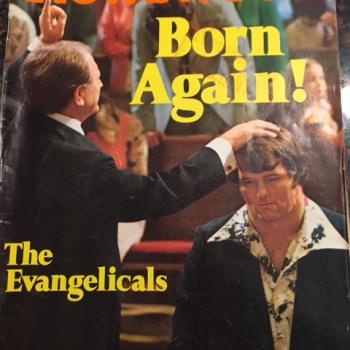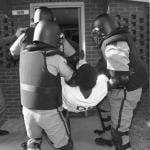One Sunday when I was a kid, Pastor Stady announced that our church had the opportunity to sponsor a family of “boat people.” That was the popular term then — I guess this would’ve been about 1980 or ’81 — for the refugees who fled from Vietnam after the fall of Saigon. Some two million people took to the sea or attempted to escape from the region overland, risking incredible danger in an attempt to save their families. More than half of them didn’t make it.
Here in America, Congress passed the Refugee Act of 1980 to increase the number of refugees accepted into this country and to expedite the process for the allies we had left behind in Vietnam. The bill passed easily with wide and enthusiastic bipartisan support. There was a sense of obligation and duty, but also of opportunity. We were seizing the chance to help desperate people because it was wonderful to be able to do so. And because doing so was a way of reasserting — of demonstrating — a needed sense of national greatness that had been wounded and diminished by the loss of the war in Vietnam and by Watergate and the hostage crisis in Iran. (Martin Longman writes about the Refugee Act of 1980 here, which is what prompted this post.)
Our church was very white fundamentalist and very white conservative politically. In Sunday school classes I had studied the young-Earth creationist “flood geology” of Henry Morris and the premillennial dispensationalist folklore of Hal Lindsey. In our “King’s Kids” junior-high youth group, we rehearsed the clumsy apologetics of Josh McDowell. Politically, everyone was Republican (except for Mrs. Penrose and Mr. Jackson) and giddily supportive of Ronald Reagan.*
That was the congregation Pastor Stady was addressing when he announced that our church was going to sponsor a family of boat people refugees. And that congregation was thrilled to have the chance. It was like getting to be missionaries right here at home.
We took up special offerings to pay the rent on a nice apartment in Plainfield and we collected furniture, clothing, linens and household goods to help them feel at home. A delegation of church ladies even went grocery shopping with money from the deacon’s fund to stock the refrigerator and kitchen the day before the family moved in.

In part, we felt that we had a special obligation to help people like this family. Our congregation had supported the war and so we were obliged to support the refugees fleeing the outcome of that war. That was obvious to us, and we recognized this was something we really had to do.
But more than that, it was something we got to do — and we were thrilled to do it. It wasn’t simply a begrudging obligation that we grimly accepted. It was an exciting chance to participate in an exciting mass-effort. It was “Please, please can we?” not “Oh, fine, if we must.” We approached it with both a sense of star-spangled patriotism and Christian missionary zeal. The chance to welcome this family to America was cause for celebration.
I don’t mean to paint an overly rosy picture of what our church did then. The apartment we rented for this family, after all, was in Plainfield and not, like our church itself, in North Plainfield — not in our back yard, as it were. We were who we were, and that wasn’t always pretty, but it did not yet entirely prevent us from welcoming a desperate family into America even though they didn’t speak English and they weren’t white or Christian.
I don’t think the response from our congregation made us unusual or exceptional. The “Boat People” crisis and the ensuing media hype produced a widespread national response that hit all those aspirational notes from Lazarus’ “New Colossus.” Welcoming refugees was seen as patriotic, as Christian, as non-partisan, as non-controversially good news.
In typical American fashion, we celebrated ourselves and congratulated ourselves for this expression of exceptional American idealism, scarcely even noticing that the tens of thousands of refugees we were resettling paled in comparison to the hundreds of thousands finding new homes in China and Thailand and other smaller and less-prosperous countries.
And, of course, the initial enthusiasm for welcoming “boat people” gradually faded. Those people soon became “those people” in the white imagination, and many of the same people who had earlier said, “Yes, of course, how can I help?” were later the same kind of people laughing at Clint Eastwood’s racist jokes in Gran Torino.
But today, in the 2018 America of the 81 percent and the 40 percent, the demonstration of national hospitality and American ideals that led so many of us to eagerly welcome the “boat people” — at least initially — seems completely gone. We no longer seem to have any sense of obligation to the refugees fleeing the countries we bomb and then abandon. The stunted counterfeit notions of “patriotism” we now perform or put on as a cheap costume make the words on the Statue of Liberty seem like a cruel joke. And the white evangelical churches that once embodied the ideals of “missionary” Christianity emphatically reject the idea that any of those people from the mission field be allowed to cross the sacred borders of our white nation.
We have — as Americans, as Christians — gotten smaller, crueler, uglier, and more selfish. We act like the world is a zero-sum game of musical chairs, and we’ll shiv anybody who we fear might be trying to take our seat.
What we have lost is massive and important. Getting it back won’t be easy.
Since Lady Liberty and Pastor Stady and the Nguyens and Martin and I are all from New Jersey, let me close with this from Bruce Springsteen. “Galveston Bay” doesn’t have the catchiest melody, but read the lyrics — the story here is beautiful.
I once thought of this as an all-American story. Whether or not it still is I’m no longer sure.
– – – – – – – – – – – –
* This was the early 1980s, so that support for Reaganism and the Republican Party had nothing to do with abortion or anti-gayness. Those issues weren’t yet on our radar.** Our Republicanism and Reaganism had to do with standing up to the Commies and the Ayatollah and with not looking weak by giving away canals and such. Years later, we’d spend a series of Sunday evening services watching awful Francis Schaeffer movies that would convince us to regard anti-abortionism as a new part of our faith and citizenship. Happily, it turned out that all that required of us was blanket support for Reagan and the Republican Party, which we were already doing. (It turned out we were already heroic champions of the Most Important Cause of All Time, without even knowing it. So that was nice.)
** Well, there was one guy — Mr. N., who made all his kids go to Bob Jones — who was fired up about the Big Gay Menace in the late ’70s. But there was something creepy about his obsession with Anita Bryant, so he didn’t manage to get anybody else on board with that.
We later learned he beat his wife. So.












